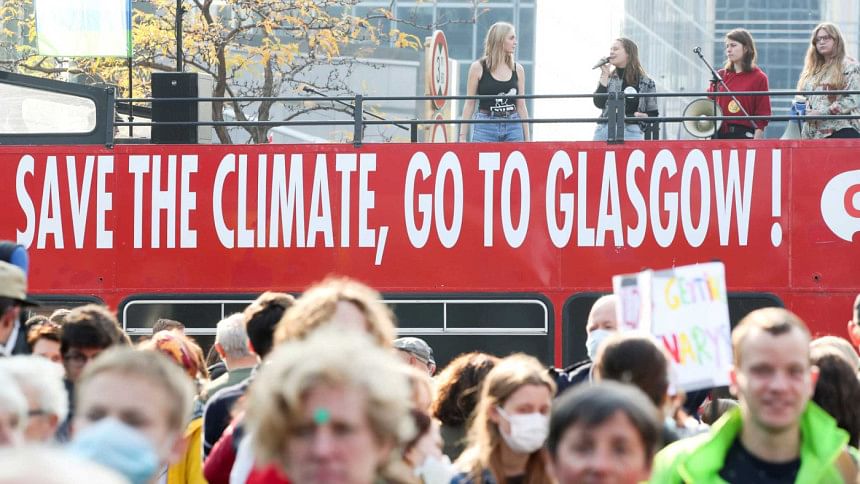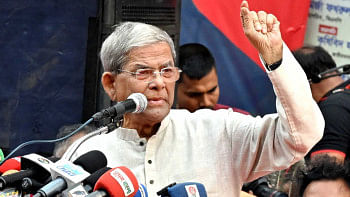Bangladeshi delegates to COP26 have a tricky job on their hands

Tomorrow, on October 31, world leaders and top climate officials will come together to discuss climate change against the backdrop of Covid-19 and an already rapidly changing natural environment. This year, the 26th Conference of Parties (COP26) in Glasgow, Scotland presents an important opportunity for delegates. Not only is the world seeing the light at the end of the Covid-19 tunnel, but sentiments from the US and China are shifting whereby green growth can act as a catalyst for economic dominance in a post Covid-19 era. For countries like Bangladesh, the challenge will be to adapt—quickly—to a new, inclusive green economy that can take advantage of a changing global economy. Already, the textile sector in Bangladesh has been significantly impacted by changing consumer preferences in Western countries for more sustainable, green products, and labelling that can showcase a product's green credentials. Bangladesh's economy is at risk of falling behind if appropriate steps aren't taken to implement an inclusive green economy, as investment will move towards producers that can.
With supply chain constraints and concerns of rising inflationary pressures, delegates to COP26 face a tricky task as Bangladesh transitions into a middle-income economy. This will require significant action. First, COP26 provides a forum for many countries, including Bangladesh, to present updated Nationally Determined Contributions (NDCs), which details the level of political commitment and a roadmap on how to achieve greater climate change resilience. The Bangladesh government provided an updated NDC in August 2021 in preparation of COP26. The new NDC outlines a goal for 6.73 percent reduction in emissions below the 2012 baselines, and a further 15.12 percent reduction below 2012 emissions if the government receives international funding and technology support. Given the recent rise in per capita emissions in the last three years, this will be a challenge for Bangladesh, but it presents a meaningful commitment to mitigation efforts. More importantly, delegates must have a clear vision of how Bangladesh can achieve its mitigation and adaptation goals and prevent an "ambition gap" from forming.
The Bangladesh government has already articulated this vision through a range of policy documents, including the National Adaptation Plan (NAP) and the Bangladesh Climate Change Strategy and Action Plan (BCCSAP). But how the government can secure the necessary resources, climate finance, technology, and support to achieve its vision depends on how its delegates can seize asymmetric opportunities to extract concessions during negotiations.
This is where the challenge for a green economy lies. Delegates must develop a long-term perspective, coupled with strategies that can enable consensus building, even if that requires increasing the scope of potential items to negotiate to extract mutual concessions. For instance, participation in a global emission trading scheme will bring specific short-term challenges for Bangladesh, but making participation contingent on additional support can ease transition, support those who are adversely affected by an emission trading scheme—while encouraging the growth and development of clean, efficient businesses—and strengthen Bangladesh's economy and supply chains to more environmentally conscious consumers. This not only includes obtaining support in the form of Article 6 measures that allow wealthier countries to compensate Bangladesh through clean development projects, but also making emission trading scheme participation contingent on contributions from developed countries towards the Climate Change Fund or even trade facilitation efforts for Bangladesh's green sectors.
The Bangladesh delegates to COP26 will also be tasked with approaching developed countries to address the big elephant in the room: loss and compensation for existing contributions to climate change. Bangladesh is disproportionately vulnerable to the existing climate change impacts. Together with small island states, Bangladesh has already seen significant internal migration as agricultural opportunities and incomes decline due to soil degradation, salinity intrusion, increased frequency of severe weather events (including flooding), and rising input costs. Increasingly, rural people are forced to move to major metropolitan areas in search for new job opportunities to supplement their incomes. Developed countries have a moral responsibility to compensate due to their contributions to carbon emissions that have resulted in the existing damage, improving the lives and livelihoods of those who are most affected. Calling on developed countries to be accountable for their carbon emissions is a significant bargaining chip to motivate them to take up adaptation and other capacity-building initiatives to enable green economies.
Bangladesh is not alone. COP26 provides an opportunity for delegates to seek partnerships with other developing countries for improved South-South cooperation and triangulation with developed countries. Improved South-South cooperation will be needed to address capacity constraints and share knowledge on how to engage in actions that deliver on the NDCs. The developing country negotiation bloc is becoming increasingly more powerful as the global economy and transnational nature of supply chains enable them to have a stronger voice in how a green economy can be realised. At COP26, Bangladesh must pursue sharing expertise with fellow developing countries as to how to increase its capacity to regulate effectively, implement development programmes, and generate the political will with key stakeholders who remain invested in the "old economy."
The real work awaits beyond COP26, however. The Bangladesh government will be challenged to reform existing policies to mainstream an inclusive green economy across its development agenda. This includes reforming development and industry policies to shift from just climate mitigation and adaptation actions to transitioning into a new green economy. This not only requires substantive reforms such as creating new green jobs or demand-side pressures for environmental performance (e.g. by creating carbon emission and pollution standards), but also fundamentally changing how policy is implemented and evaluated. Budgeting for a green economy and introducing metrics that value ecosystem services and nature-based solutions to assess economic performance are measures that need to be introduced to ensure a post-pandemic recovery. Changes in monitoring and evaluation can only be achieved if the government has the capacity to perform this task. The delegates to COP26 must secure resources, funding arrangements and know-how to implement such reforms and mainstream an inclusive green economy in the country.
Bangladesh has transformed as it has embraced the changes in the global economy—creating new industries, new opportunities for women, and securing local jobs. However, without embracing an inclusive green economy, the country remains at risk of being left behind and losing valuable opportunities, as global economies seek to green their supply chains and improve their environmental performance that is demanded by end users and consumers. What happens in Glasgow in the next two weeks will be highly consequential in how the economy can be transformed to a green economy. A green economy is not just empty rhetoric; it provides a pathway that reimagines climate change not just in negative terms, but as an opportunity for developing countries—as well as Bangladesh—to secure new opportunities for sustained economic growth, resource efficiency, and productivity.
The challenge for Bangladesh in COP26 now is to rise to this task and seize the opportunities that a green economy presents. It's not just a matter of survival; it's also necessary for Bangladesh to thrive.
Dr Shawkat Alam is a professor of international and environmental law and the director of international engagement in Macquarie University, Australia.

 For all latest news, follow The Daily Star's Google News channel.
For all latest news, follow The Daily Star's Google News channel. 



Comments